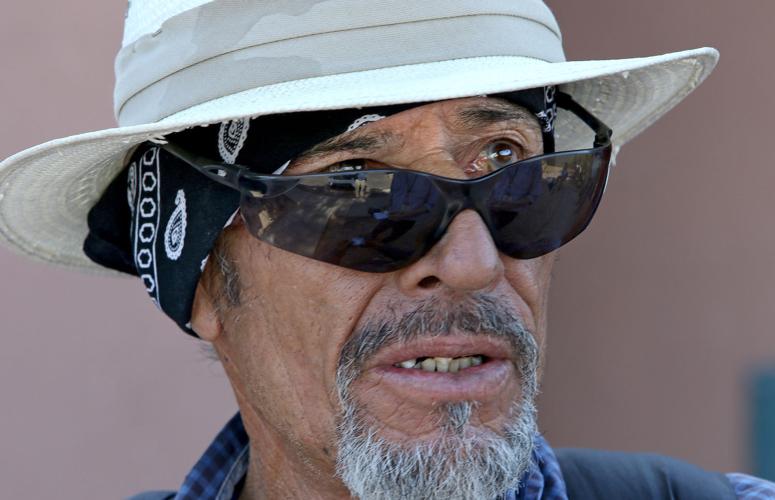There’s plenty of work to do these days in Tucson — that’s for sure.
Thanks to the summer rains, any given block is lined with weeds and has yards overflowing with unwanted greenery that mosquitoes call home.
And there are plenty of people who need the work — for sure. You can see that on any given corner, in the washes, in the parks.
But putting those two together — the work that needs to get done and the people willing to do some of it — is not as simple as it should be.
That’s why many Tucsonans, such as attorney David Hill, got excited last week, thinking about the ramifications for Tucson of a Washington Post story about Albuquerque. After the Post ran the piece last week, Hill wrote to our mayor, city manager, City Council and me asking them to look into the program Albuquerque Mayor Richard Berry started.
Berry, a Republican in a Democratic city, started “There’s a Better Way,” an anti-panhandling program with the potential to help some people out of homelessness. The most intriguing part of the program is a passenger van the city bought: An employee drives around four times a week and picks up people who are panhandling but willing to spend time working.
The van can hold up to 10 people, and each one gets lunch as well as a ride back to the St. Martins Hospitality Center, a homeless shelter where some services are available, at the end of the day. Each person is paid $9 per hour but is limited to making $600 per year through the program.
Now, Tucson and Albuquerque are a lot alike — in our size, our economies, our demography, and our problems. So it makes some sense that a solution in Albuquerque could also work in Tucson.
But to an extent, Tucson already has programs something like the Albuquerque effort. Primavera Foundation has its Primavera Works business, which gives residents of the foundation’s homeless shelter and other underemployed people a chance to work, mostly in landscaping jobs.
Potential clients call the program (882-9668) to make arrangements or get a bid, if it’s a big job. The rate is between $13 and $16.25 per hour, supervisor Sean Hughes told me. That includes workers’ comp insurance, but of course the overall rate is a bit high for many Tucsonans.
“It is Tucson, and everything is based on people’s budgets,” Hughes said. “A lot of people can’t afford to hire people.”
Which brings me to the Southside Worker Center, a program at Southside Presbyterian Church, 317 W. 23rd St. The 10-year-old effort systematized the longstanding practice of contractors picking up day laborers at Home Depots or other handy pick-up spots.
That still happens in some places, but at Southside, there is more protection for worker and employer. The workers aren’t allowed to smoke, drink or otherwise misbehave at the center, and the employers are required to pay at least $10 per hour and identify themselves, in case there is a dispute about wages later.
Jose del Toro, who shows up to work at the center regularly, explained to me Tuesday morning how the system works. The names of whoever shows up by 6 a.m. are entered in a raffle that decides in what order employers may pick up workers.
Hour by hour, names are crossed off, as people leave in pickups and minivans to go to job sites. Del Toro was still there at 10 a.m. Tuesday because he drew a low number. But Evaristo Ramirez showed up, as he occasionally does, and picked up another man, promising $15 per hour to dig trenches for irrigation for two or three hours.
An average of 10 people a day get work at the center, he said, and some workers never get picked up. That’s a shame in a city that has so much work to be done.
But of course, this is a different crowd than the one the Albuquerque mayor’s program seeks to serve. These are mostly immigrant workers, generally not homeless, though anyone may show up, register and offer their labor at Southside.
Many of us in Tucson have our own personal version of the Albuquerque program. We know homeless, young or underemployed people who are willing to do hard outdoor labor that we don’t want to — or can’t.
Just last weekend I hired a man known around the neighborhood to do five hours of work cleaning out weeds. I paid him $50 — simple. Across Tucson, many people have simple arrangements like this, but a minimum level of trust is necessary to make it work.
The city has an initiative, the Community Workforce Skills Program, under which city departments can hire young people or others needing work experience to do funded municipal work. But it’s not simple and streamlined like the Albuquerque program.
What’s so attractive about that is that it involves big institutions — the city and a social-service agency — in an eminently simple effort. It’s like a combination of Primavera Works with hiring the neighborhood guy.
Councilman Richard Fimbres said he has held several meetings since June 30 with local groups, gauging interest and finding a path toward a similar program. People are interested, Fimbres said via email.
“The work is now to find a location, obtain a van and have navigators, and to do the project two days a week as Albuquerque started with,” he said.
It may not be typical in Tucson to minimize the bureaucracy, maximize simplicity and apply underused labor to an unmet need, but it could just catch on.
And everybody can see our needs are growing like weeds.





